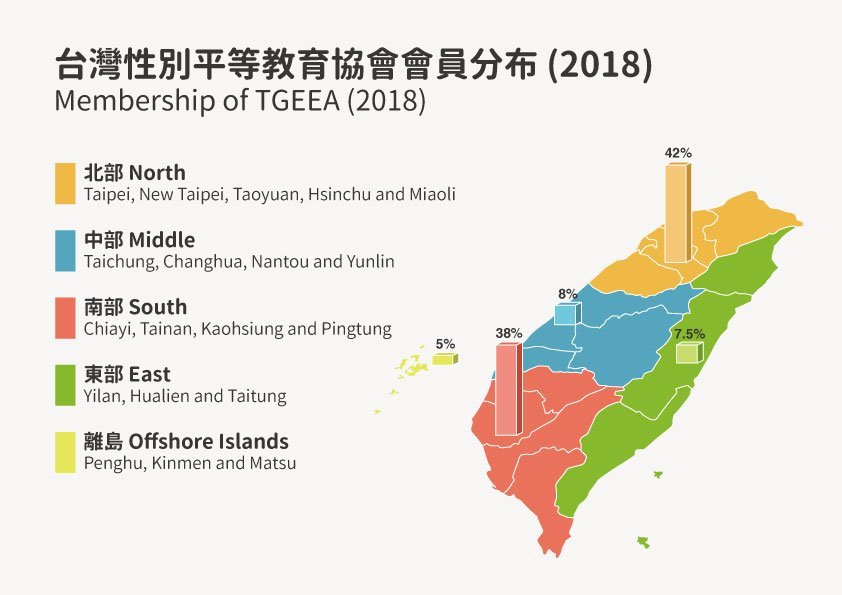About TGEEA
Taiwan Gender Equity Education Association (TGEEA), founded in 2002 by a group of school teachers and social activists, aspires to achieve gender justice and diversity in Taiwan through Education.
As a non-government organization, TGEEA has dedicated itself in the following endeavors: gender justice reach out programs for teachers, students and parents at various levels of education, development of instructional materials and effective strategies for gender equity education, and keep a vigilant watch over the official implementation of the Gender Equity Education Act. In addition, TGEEA has actively participated in international networking with similar NGOs abroad. Since 2010, TGEEA has been a principal contributor in writing a comprehensive CEDAW shadow report evaluating how Taiwanese government has accomplished to push for an inclusive gender justice in Taiwan.
In recent years, Taiwan has witnessed a growing opposition to gender inclusive education, particularly from the religious right groups as evidenced globally. Such opposition has created a homophobic and hateful environment in schools and in society. Believing in the power of Education, TGEEA hopes to strive with every possible way to make a more just and friendly Taiwan for all.
On November 30, 1996, Ms. Wan-Ju Peng, a long-term women’s rights activist and then director of the DPP Women’s Department was raped and murdered after taking a taxi late at night and her body was found abandoned in Kaohsiung’s Wusong District. This tragic incident served as a catalyst for the enactment of the “Sexual Assault Crime Prevention Act” in 1997 and the establishment of the “Gender Equity Education Committee” and the “Committee for the Promotion of Women’s Rights” by the Ministry of Education and the Executive Yuan, respectively.
On April 20, 2000, a male junior high school student who had been the victim of long-term bullying on campus due to his femininity excused himself from music class to go to the bathroom alone since he feared harassment by his classmates when using the bathroom after class. He was later found lying in a pool of blood and later pronounced dead at the hospital.
Foundation of TGEEA (2002)
After the establishment of TGEEA in 2002, it provided follow-up assistance for the Yeh, Yung-chih Incident Shortly after, the draft of the ” Equity Education Act for Both Sexes”, which was still under deliberation, was officially renamed to “Gender Equity Education Act”.
In 2004, TGEEA jointly launched the “Alliance for NGO Promotion of the Gender Equity Education Act” in collaboration with several related organizations. These determined actions and efforts greatly aided the passing of the “Gender Equity Education Act” in three readings in the same year.
TGEEA provided continued support to the parents of Yeh, Yung-chih in the litigation procedures associated with this case starting in 2002 until the final verdict in June 2006. The association and its partners still maintain an excellent relationship with the parents and family members of Yeh, Yung-chih.
CORE GOALS
- Elimination of gender discrimination and building of a society characterized by diversity and equality.
- Promotion of an educational environment conducive to gender equity.
- Promotion of research and educational efforts conducive to the development of localized gender education models.
- Formation of an emotional and informational support network for gender equity educators.
Active Advocacy
Monitoring of policies and legislation at the central and local levels, commenting on current events, and vocal advocacy through action.
Education Promotion
Acceptance of lecture invitations, organization of continuing education activities and training seminars on gender equity.
Resource Provision
Provision of advice for the handling of gender equity incidents on campus and consultation on the "Gender Equity Education Act".
Publication Development
Development of teaching materials and approaches and design of teaching aids such as board games and interactive media.
Support and Empowerment
Forming of linkages between gender-friendly educators, sharing of teaching experiences, and exchanges between members and partners.
International Exchanges
Participation in national and international exchange activities on gender equity and monitoring of international conventions.
Membership

